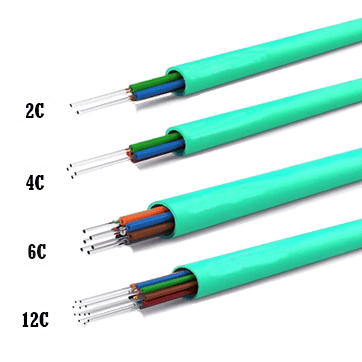Uncategorized
Fiber Cable Uses in Internet and Broadband 2024
Fiber Cable Uses
Fiber optic cables are used in various applications across different industries due to their unique advantages over traditional copper cables. Here are some common uses of fiber optic cables:
- Telecommunications:
- Long-Distance Communication: Fiber optics are widely used for long-distance communication, including internet backbone networks and undersea cables. They offer high bandwidth and low signal loss over extended distances.
- Internet and Broadband Services:
- Last-Mile Connectivity: Fiber-to-the-Home (FTTH) and Fiber-to-the-Premises (FTTP) technologies use fiber optic cables to provide high-speed internet services directly to homes and businesses, offering faster and more reliable connectivity compared to traditional broadband.
- Data Centers: Fiber Cable Uses
- High-Speed Data Transmission: Fiber optic cables connect servers, storage, and networking equipment within data centers. Their high bandwidth and low latency are essential for handling the massive data loads associated with modern cloud computing and data storage.
- Telephony and Voice over Internet Protocol (VoIP): Fiber Cable Uses
- Clear Voice Transmission: Fiber optics ensure high-quality voice transmission in telephony and VoIP systems. They offer a reliable medium for carrying voice signals with minimal interference.
- Cable Television (CATV):
- High-Definition Video Transmission: Fiber optics are used to transmit high-definition video signals in cable television networks. They provide the necessary bandwidth for delivering multiple channels and on-demand content.
- Medical Imaging and Equipment: Fiber Cable Uses
- Endoscopy: Fiber optic cables are employed in medical endoscopes for imaging and diagnostics. They allow for flexible and thin cables, enabling minimally invasive procedures.
- Surgical Lighting: Fiber optics provide bright and focused illumination for surgical procedures, ensuring precision and clarity.
- Military and Aerospace Applications:
- Secure Communication: Fiber optics are used in military and aerospace applications for secure and interference-resistant communication. They are immune to electromagnetic interference and can transmit data over longer distances.
- Industrial and Manufacturing:
- Automation and Control Systems: Fiber optic cables are utilized in industrial automation and control systems, providing reliable communication between sensors, controllers, and equipment in manufacturing processes.
- Networking and Local Area Networks (LANs):
- High-Speed Networking: Fiber optics are increasingly used in LANs and corporate networks to provide high-speed data transfer, especially in situations where electromagnetic interference is a concern.
- Security and Surveillance: Fiber Cable Uses
- CCTV Systems: Fiber optic cables are employed in Closed-Circuit Television (CCTV) systems for transmitting video signals over long distances with minimal signal loss. This is crucial for maintaining the quality of surveillance footage.
- Utilities and Power Transmission: Fiber Cable Uses
- Smart Grids: Fiber optics play a role in smart grid applications, providing communication infrastructure for monitoring and controlling power distribution systems.
- Sensor Networks:
- Sensing Applications: Fiber optic sensors are used in various industries for applications such as temperature sensing, pressure sensing, and structural health monitoring due to their sensitivity and resistance to electromagnetic interference.
- Gaming and Entertainment: Fiber Cable Uses
- High-Performance Gaming Networks: In professional gaming and entertainment venues, fiber optic cables are employed to ensure low latency and high-speed data transfer for seamless gaming experiences and multimedia streaming.
- Underground and Submarine Cable Systems:
- Submarine Communication Cables: Fiber optics are used for undersea cables that connect continents, facilitating global communication.
- Educational and Research Institutions: Fiber Cable Uses
- High-Performance Computing: Fiber optic cables are integral to high-performance computing environments in research institutions and universities, where large volumes of data need to be transferred quickly and reliably.
The versatility and efficiency of fiber optic cables make them a preferred choice in numerous industries and applications, contributing to the advancement of technology and communication systems.
Fiber Cable Uses

